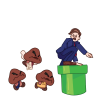Remember The Pirate Bay era of the internet before streaming services became widespread, when music was still paid per song or per album? When LimeWire was a central hub for free downloads—and malware—and people flocked to Project Free TV to watch cable-exclusive shows after they waited 20 minutes for it to load?
These sites may have been risky and inconvenient, but these relics exemplify a time in internet history when media was accessible, and free was a matter of perspective. It’s become clear, however, that this era has long since passed.
On Feb. 10, 2022, it was announced that Gary Bowser would be sentenced to 40 months in prison for “console-hacking software and devices used to play pirated Nintendo Switch games.”
Gary Bowser is a part of Team-Xecuter, a group which distributed special microchips that modified the Nintendo Switch to allow it to play pirated, or unlicensed, video games.
The FBI has described the group as a criminal enterprise, while the defense has argued they were simply advocates for homebrew programs and the consumer’s right to repair their own property. But who is right?
The answer is tricky, and only gets trickier the deeper you search. Is piracy a victimless crime—and what rights do you have with the property you own?
The problem with this case lies at the heart of what right to repair and the right to modify means. It seems the U.S. judicial system, after this sentencing, has decided to make an example of those who believe that modifying their property is harmless.
Many websites, along with the case itself, cite the use of a special microchip used to play pirated content as the indicator of criminality. However, a microchip is not specific to pirated content that these modified consoles can play, making this claim more misleading than it is informative.
Modified additions (mods) to games aren’t a new concept, and companies approach dealing with them in different ways. Bethesda’s Skyrim, for example, is a game that openly embraces mods, even encouraging them. Other companies turn a blind eye, opening modding communities for different genres of video games.
Mods are much more common in the PC gaming community because the game files are much easier to open and peer inside of than on consoles. At the end of the day, video games are simply computer files just like any other application.
While consoles are essentially computers, they run on an operating system that is built specifically for that piece of hardware, only allowed to do what the company wants it to do. Digging into files is extremely limited, and the only way to alter a console’s system is through a technique known as jailbreaking, the overriding of a manufacturer’s software to implement unauthorized use.
However, cracking open a console often ruins its capability to perform a lot of functions that it was typically built to do. The PlayStation 4 jailbreak exploit was a great example of this, as hackers were able to find a gap in the firmware through a console bug that PlayStation eventually patched.
Team-Xecutor made a device that mirrors much of the functionality of jailbreaking a device. It allows the Nintendo Switch to run things that it wasn’t originally designed to. Of course, this does mean pirated content can be played. However, it also allows game mods to be utilized, as well as content built by the user themselves. Users can modify the interface of the console, and others may simply wish to treat the console more like a standard computer.
PCs simply don’t have this problem because that is what computers are built for. Games and applications have to be built somewhere—and they are always built on a PC, Mac or Linux machine. There’s seldom a reason to distinguish between a homebrew application and a regular application because, to a computer, they are the same thing. Anyone can build whatever they wish to on a computer. So why are consoles treated differently?
Again, there is no clear answer. A gaming console—a computer product that an individual paid for and now owns—should, in theory, allow the owner to do whatever they want to it, so long as the modifications don’t directly affect other owners. However, the ruling in Bowser’s case shows that special rules apply—that owners of a product don’t seem to have the rights to modify their property.
The judgment comes from the device’s ability to allow for pirated content, but the reality is that it simply allows users more autonomy to modify and repair their own property. It’s a scenario that’s both head-scratching and frustrating for curious minds and avid tinkerers, and those who simply can’t afford new technology.
